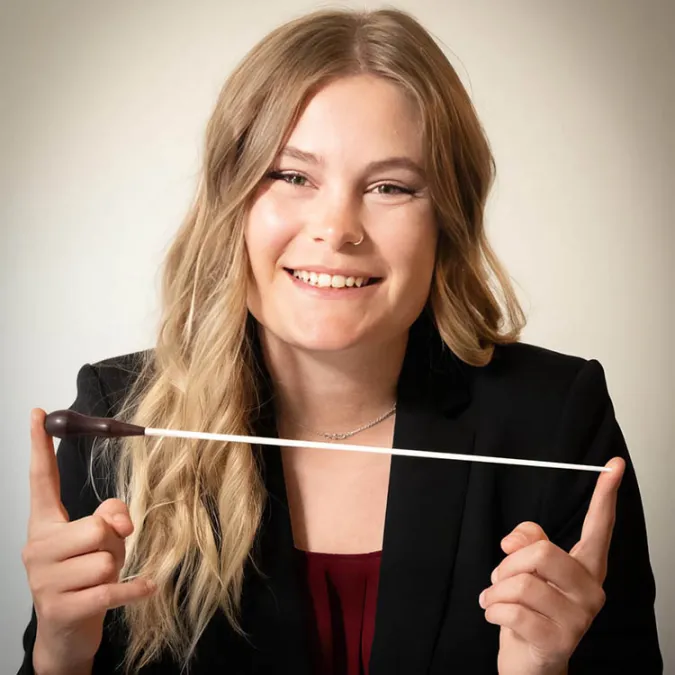
Jerry F. Junkin, conductor
Emily Warren, guest conductor
This concert will last about one hour with one intermission.
Please silence your electronic devices.
Photography, video, or recording of any part of this performance is prohibited
Program
Hector Berlioz
arr. Schuller
Overture: Le Corsaire
Gunther Schuller
Meditation
Emily Warren, conductor
Scott Joplin
arr. Schuller
Combination March
intermission
Schuller
Symphony No. 3, In Praise of Winds
Andante, spaciously. Allegro.
Moderato Tranquillo
Scherzo
Finale Rondo
In honor of the centennial of Schuller’s birth
About the Program
Program notes by Mark Bilyeu
Hector Berlioz
Overture to Le Corsaire
Born December 11, 1803, La Côte-Saint-André, France
Died March 8, 1869, Rue de Calais, Paris, France
Composed 1845 / 1971
Duration 8 minutes
In 1831, Hector Berlioz took a trip to Italy by way of a death-defying voyage by sea: the ship almost sank, and one of his fellow passengers was a retired Venetian pirate (also known as a “corsaire”). He arrived on land – alive – only to receive word that his fiancée, Marie Moke, had married Camille Pleyel. Swearing revenge, he made plans to return home, murder the two newly weds, and then take his own life. Thanksully, cooler heads prevailed, and he instead opted to tour Tuscany and Latium. He took with him a book of writing by Lord Byron, which included the story The Corsair, a narrative poem which told of a pirate chief, his attempts at thievery and large-scale rebellion. This was all a bit too close to home for the notoriously hot-blooded composer, who recalled “I followed the Corsair in his desperate adventures. I adored that inexorable yet tender nature – pitiless, yet generous – a strange combination, apparently contradictory feelings; love of woman and hatred of his kind. During the fierce summer here I used to spend whole days in St. Peter’s Cathedral in Rome, comfortably established in a confessional, with Byron as my companion. I sat enjoying the coolness and stillness, unbroken by any sound save the splashing of the fountains outside. And there, at my leisure, I sat drinking in that burning poetry.” Nearly fifteen years later, in 1845, Berlioz turned back to that story and crafted his raucous and dazzling overture, full of the drama and adrenaline of that oceanic journey which brought him to Italy.
Gunther Schuller
Meditation
Born November 22, 1925, New York City, New York
Died June 21, 2015, Boston, Massachusetts
Composed 1963
Duration 6 minutes
There are few musicians as singular as Gunther Schuller. Born to German immigrants in New York City, the fifteen year old Gunther was hired as a French horn player with the American Ballet Theatre, which followed an appointment with the Cincinnati Symphony as their principal hornist, and then a fifteen-year stint as a member of the Metropolitan Opera Orchestra. His interests then led him to explore jazz and its intersection with classical music, coining the term “Third Stream,” and founding organizations like the Jazz and Classical Music Society in New York, the New England Ragtime Ensemble, the music publishing company Margun Music, and the record label GM Recordings. He studied and toured with Dizzy Gillespie and John Lewis, he authored two major books on the history of jazz, and was the co-director of the Smithsonian Jazz Masterworks Orchestra. A highschool dropout, his academic credentials show a deep commitment to learning. He was appointed as the artistic director of the Tanglewood Music Center directly after Aaron Copland’s departure from the role, was the president of New England Conservatory, and taught at both the Manhattan School of Music and Yale University. His compositional output includes over two-hundred works which range from solo piano to concertos for full orchestra, to many works in the “Third Stream” style. He was an advocate of minoritized composers, having orchestrated Scott Joplin’s only known surviving opera Treemonisha for Houston Grand Opera’s 1975 premiere of the work, and is responsible for editing and posthumously premiering Charles Mingus’s final work “Epitaph.” Schuller described himself best in a 2010 interview with The Guardian, saying "The thing that may make me unique is that I have simultaneously had seven full-time careers in music over the last 50 or 60 years. That's more than Leonard Bernstein."
“The main characteristics of this work were pre-determined by the terms and implications of the commission:” explained Schuller, “ a piece of "restful" music playable by high school bands. I decided that I would devote much of the work to exploration of individual and mass sonorities available in the band; thus, the multiple divisi of the clarinets, the considerable use of the low-register members of the clarinet family, the juxtaposition of various brass sonorities throughout the piece, and in general, the exploitation of the lyric quality of wind instruments.
Twelve-tone organization in this work is relatively simple, being limited to the use of one row, or set form, at a time. Thus, the prime form is represented in the first twelve pitches heard in the composition. The inversion of the row is used next, followed by its retrograde and retrograde inversion. This four-part pattern is continued throughout the other eleven transpositions of the set.”
Scott Joplin
Combination March
Born November 24, 1868, Texas
Died April 1l 1917, New York City, New York
Composed 1896 / 1975
Published 1896
Duration 6 minutes
Although Scott Joplin’s music is often unfairly distilled to the “Maple Leaf Rag,” his compositional output was far more wide-ranging than the syncopations of the rags that would be published towards the end of his life. It was his 1896, when a twenty-eight year old Joplin had his second march for piano solo published. Although the title’s significance is lost to history, the work caught Gunther Schuller’s attention in the early 1970s, likely as he was beginning to undertake the project of orchestrating Joplin’s opera Treemonisha for it’s posthumous premiere - which earned a Pulitzer Prize in 1976, recognizing Joplin’s contributions to American music.
Gunther Schuller
Symphony No. 3, In Praise of Winds
Born November 22, 1925, New York City, New York
Died June 21, 2015, Boston, Massachusetts
Composed 1981
Premiered 1981, University of Michigan, Ann Arbor, Michigan
Duration 30 minutes
Schuller’s Symphony No. 3, dubbed “In Praise of Winds” was commissioned by the School of Music and the University Bands at the University of Michigan in honor of the centennial celebration of the School of Music. The work calls for behemoth forces (ideally no fewer than 104 musicians!), which are hardly all playing at the same time. According to Schuller hiumself, "The first movement, with its somewhat somber and portentous opening, soon develops into a bright allegro . . . The second movement is mostly slow and serene, exploiting quartal harmonies and the more pastel colors of the ensemble. A virtuoso Scherzo follows . . . Movement four is cast in Rondo form in which both the main thematic material (fanfare in character) and the interspersed 'episodes' are constantly varied, either in orchestration or in substance."
About the Artists
Emily Warren

Emily Warren attends The University of Texas at Austin, where she is currently pursuing a doctor of musical arts degree in wind conducting. As a graduate teaching assistant, she works with the university’s athletic and concert bands, assisting with administrative duties and conducting the ensembles. Additionally, she teaches courses in conducting and wind band literature. Prior to her graduate studies, Emily lived in Massachusetts where she spent four years as a public school music educator. She is a specialist in electroacoustic repertoire for wind ensemble and has been invited to present her research internationally, most recently at the IGEB (International Society for the Promotion and Research of Wind Music) conference in Valencia, Spain. Emily holds a bachelor's degree in music education from Indiana University and a master's degree in wind conducting from the University of Kansas, where she studied under the direction of Dr. Paul Popiel. She is an active member of various professional music organizations, including CBDNA, TMEA, IGEB, and is an honorary member of Kappa Kappa Psi.
Jerry Junkin

Serving since 1988 on the faculty of The University of Texas at Austin, where he holds the Vincent R. and Jane D. DiNino Chair for the Director of Bands, in addition to serving as a University Distinguished Teaching Professor, Jerry Junkin is recognized as one of the world’s most highly regarded wind conductors. Previously, he served on the faculties of both the University of Michigan and the University of South Florida. In addition to his responsibilities as professor of music and conductor of the Texas Wind Ensemble, he serves as head of the conducting division and teaches courses in conducting and wind band literature. He has served as music director and conductor of the Hong Kong Wind Philharmonia since 2003, and as artistic director and conductor of the Dallas Winds since 1993. He also serves as visiting professor at the Senzoku Gakuen College of Music Wind Ensemble in Tokyo, Japan. Mr. Junkin has conducted All-State bands and festivals in forty-eight states and five continents, and is a Yamaha master educator.
Wind Ensemble
Flute
Diego Arias
Gianna Baker
Riley Bender
Margaret Chvatal
Jane Fajardo
Mercedes Gomez
Zachary Gray
Eunha Kim
Koustubh Galagali
Nichole Thompson
Katie Worsham
Einez Wu
Ji Soo Yoon
Oboe
Genevieve Britten
Julia Frank
Ryan Hirokawa
Rachel Marquez
Nadia Para
Clarinet
Daniel Aisenberg
Madison Bookman
Jacob Bricker
Brynn Carl
Connor Gibson
Michael Golston
Destiny Lerma
Sadie Murray
Katelyn Nguyen
Nathan Richey
Kelli Ray
Darien Salter
Mason Smith
Aldo Villanueva
Alex Vo
Bassoon
Wes Booker
Corey Castillo
Jo Hammerstein
Thomas Klink
Rishbah Sajjan
Saxophone
Ethan Ashley
David Bennette
Jacob Feldman
Ben Kaplan
Matthew Meyers
Marina Sakellakis
Horn
Madeline Artman
Ben Cummings
Maggie Euscher
Daniela Garcia
Lucas Hamilton
Dylan Marquez
Austin Waldbusser
Stephanie Wu
Trumpet
Sam Acosta
Rowan Anthony
Adam Dimas
Dash Kostka
Jax Latham
Chris Ray
Leland Rossi
Angelica Salazar
Colby Stone
Guillem Torró Senent
Trombone
Arsene Bien-Aime
Jace Byrd
Erick Galicia
Carlos Garcia
Eric Garcia
Brandon Reyes
Joshua Stout
Euphonium
Shelby Burton
Miguel Gonzales
Tuba
Ethyn Evans
Grant Fenstad
Tyler Lane
Ben McWilliams
Ajeet Nagi
Percussion
Justin Cooperman
Jaime Garcia
Matt Garcia
Randy Griner
Ethan Hall
Marcos Jurado
Caroline Richards
Harp
Natalie Rochen
Keyboard
Renan Branco
Double Bass
Gonzalo Kochi Kikuchi
Kaitlyn Ruiter
Event Details
$5–15
All University of Texas at Austin students are allowed one free ticket as long as they are available. Student tickets must be picked up at the Box Office with valid student I.D. Seating is unassigned.
If you are a patron with ADA needs, please email tickets@mail.music.utexas.edu and we will reserve ADA seating for you.

